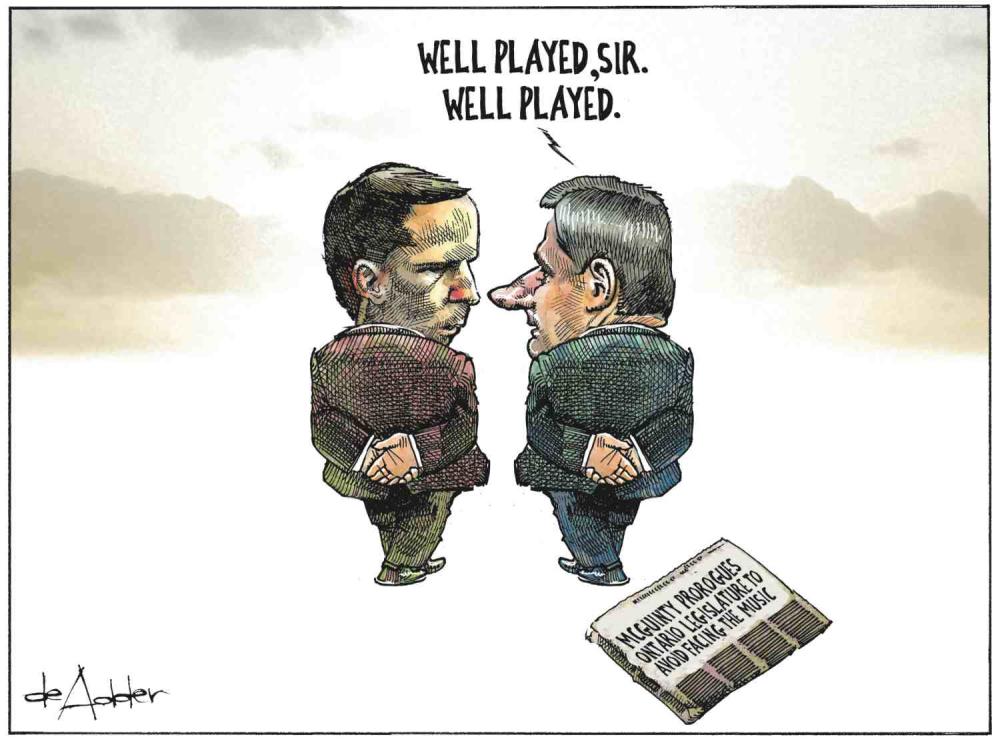
Eroding Democratic Principles at Queen's Park
The last year has been a tumultuous one for education Politics in Ontario and one that has seen democratic rights and principles die on the altar of political expediency .
The Liberals’ approach to education sector collective bargaining, its draconian legislation (Bill 115), and Premier McGuinty’s decision to prorogue the Legislature just four weeks into the fall session are all examples of a government flouting democratic principles for political convenience.
THE BROADER IMPLICATIONS OF DENYING COLLECTIVE BARGAINING RIGHTS
Collective bargaining rights are protected by the Canadian Charter of Rights and Freedoms because they are recognized as playing an essential role in ensuring relative fairness in the workplace and providing a system of checks and balances that determines economic welfare and fair working conditions. Exercising these rights is fundamental to the functioning of democratic societies. Bill 115 undermines these rights by giving unfettered power to the minister to stop ETFO members from engaging in job action, even if they are legally entitled to do so. More broadly, the sweeping powers Bill 115 confers on the minister and cabinet place their actions beyond the scrutiny of the Ontario HumanRights Code, Ontario Labour Relations Act (OLRA), and the courts – setting a dangerous precedent for Ontario. Any legislation that interferes with citizens’ constitutional rights and exempts the government from complying with Canadian law must be challenged.
ABUSE OF PROROGATION
On October 16, Dalton McGuinty announced not only his resignation as premier but also his request that the lieutenant governor prorogue the legislature. Prorogation means the business of the Legislature is suspended. Not only is Question Period, the daily accountability session, cancelled, but so too is all the committee work MPPs do. The committee process provides MPPs and the public the opportunity to carefully scrutinize legislation and other matters before the legislature.
Prorogation is a tool used by all parliamentary governments. It is commonly used during a government’s mid-term to refresh the government’s agenda or to suspend the legislature when it’s time for a general election. Recently, however, federal and provincial governments have used prorogation to avoid a confidence vote, which in a minority government situation would lead to an election, or to shut down a damaging political issue. Constitutional experts and others argue that these applications are a misuse of prorogation. They undermine democratic principles and conventions and compromise the ability of opposition parties to keep the government accountable.
Dalton McGuinty’s decision to prorogue was clearly an example of abuse. It was prompted by a desire to avoid losing a confidence vote on a contentious broader sector wage restraint bill and to shut down the growing scandal related to the 2011 election campaign decision to close two gas-fired energy plants to save a number of Liberal seats in the Greater Toronto Area. The closures will likely cost taxpayers more than $700 million.
The McGuinty prorogation follows in the footsteps of his federal counterparts. Former prime minister Jean Chrétien prorogued Parliament in 2002 to avoid the consequences of the sponsorship scandal. Prime Minister Stephen Harper used prorogation in 2008 to prevent a non-confidence vote and a potential Liberal–NDP coalition government, and again in 2009 to shut down a parliamentary committee’s investigation of the military’s mistreatment of Afghan prisoners.
FIGHTING FOR DEMOCRATIC PRINCIPLES
What are the broader implications of a bill that gives a minister extraordinary powers to intervene in collective bargaining? Should the public care about this misuse of prorogation? In response to McGuinty’s decision, constitutional scholar Peter Russell stated: “When parliamentary democracy is reduced to whatever is convenient for the governing party, we are coming very close to losing it.” According to an October Angus Reid poll reported in the Toronto Star, 66 percent of those polled opposed McGuinty’s move.
The challenge for those concerned about the health of our democratic institutions is to actively fight back against actions that undermine them, and to work to keep the issues on the public agenda and part of public discourse.
ETFO’s fight to have Bill 115 repealed and our campaign to protect bargaining rights should be seen in the context of the broader fight for democratic principles. Our fight goes well beyond the interests of ETFO members to a genuine concern for the health and future of the democratic institutions that all Ontarians rely on.
ABOUT BILL 115: Bill 115, Putting Students First Act, 2012, imposes the terms and conditions of the OECTA agreement with the government on public school board employees. It also gives the education minister and cabinet unprecedented powers to intervene in negotiations and any potential strike action.